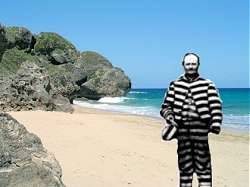Leadership and funding problems, along with incessant US-backed offensives, have prevented the Al-Qaeda-linked Abu Sayyaf from launching more major attacks, a Philippine military official said Thursday.
Abu Sayyaf factions have failed to choose a suitable replacement for rebel chieftain Khaddafy Janjalani and his successor, Abu Sulaiman, who were killed in clashes with US-backed Philippine forces in 2006 and 2007 respectively, Brigadier General Juancho Sabban said.
Janjalani and Sulaiman are believed to have united at least six Abu Sayyaf factions on the southern islands of Jolo and Basilan and developed relations with Asian and Middle Eastern financiers. A number of possible successors have been considered, according to intelligence officials.
"They haven't been able come up with a single, influential leader who can unite the different factions," Sabban told The Associated Press, citing intelligence information and monitoring of the rebels.
The Abu Sayyaf, blacklisted by Washington as a terror group for bombings, ransom kidnappings and beheadings, is believed to have launched its last major attack in February 2005 with simultaneous bombings in Manila and two southern cities that killed eight people and wounded more than 100.
An earlier military report that a little-known, foreign-educated commander, Yasser Igasan, had been picked to lead the Abu Sayyaf remains unconfirmed, said Sabban, who heads an anti-terrorism force based in Jolo, about 950 kilometers south of Manila.
Two other rebel commanders, one-armed Radulan Sahiron and young, violent Albader Parad, have not gained enough support and trust among members, he said.
During recent meetings of Abu Sayyaf commanders, arguments reportedly erupted over logistical and other concerns, Sabban said. They also apparently have problems with ammunition supplies and funds.
Indonesian militants from the Indonesia-based Jemaah Islamiyah group, who have been hiding with the Abu Sayyaf since 2003, were also constantly on the run, limiting their usefulness, he said.
Huge US rewards offered for two top Indonesian terror suspects, Umar Patek and Dulmatin, have severely constricted their movement.
"They have to constantly hide because even from within their ranks, some are eyeing such rewards," Sabban said.
American and Philippine experts have been conducting DNA tests to confirm if a cadaver dug up in Tawi Tawi province, near Jolo, in February was that of Dulmatin.
An Indonesian police official has said the body was not Dulmatin's, citing initial DNA test results, but Philippine police say they will make an official announcement after US experts complete the testing.
Efforts by Philippine and US forces to ease widespread poverty on Jolo -- a predominantly Muslim island where fewer than 200 Abu Sayyaf members hide in remote jungle camps -- are weaning communities away from the militants, Sabban said. Projects include repairing roads, schools and water supply systems.
"Anything from us used to be considered `haram,' " said Sabban, referring to the local term for forbidden things. "Now they're clamoring for roads, schools and development from us."
|
 Usama bin Laden's son isn't the only Al Qaeda operative believed to have been killed in an attack by an unmanned U.S. drone in the past year.
Usama bin Laden's son isn't the only Al Qaeda operative believed to have been killed in an attack by an unmanned U.S. drone in the past year.
 Al-Qaida-linked militants in the Philippines continue to get significant funding from foreign donors despite a crackdown aimed at stopping the flow of cash that finances bombings and other attacks, two terrorism experts said Monday. 'There is no evidence that terrorist financial flows to the Philippines have dried up,' Rohan Gunaratna, a Singapore-based terrorism expert, told reporters on the sidelines of a Manila conference on terror financing.
Al-Qaida-linked militants in the Philippines continue to get significant funding from foreign donors despite a crackdown aimed at stopping the flow of cash that finances bombings and other attacks, two terrorism experts said Monday. 'There is no evidence that terrorist financial flows to the Philippines have dried up,' Rohan Gunaratna, a Singapore-based terrorism expert, told reporters on the sidelines of a Manila conference on terror financing. MANILA, Philippines (AP) -- Fourteen Muslim
MANILA, Philippines (AP) -- Fourteen Muslim  An Indonesian member of the Al Qaida-linked
An Indonesian member of the Al Qaida-linked